Fast cooling of hot drink without ice? Fashionable and comfortable high-heeled shoes? A profession photographer like a “boyfriend” at your disposal? None of these are problems for the University of Michigan- Shanghai Jiao Tong University Joint Institute (UM-SJTU JI) students, as you can find their solutions at the JI 2019 Summer Design Expo held on August 7. More than 80 innovative student projects were displayed on the show that dazzled the audience including enterprisers, SJTU and non-SJTU students and parents. The design projects are from a number of experimental courses of the summer semester across all grades such as “Introduction to Engineering, ”Design and Manufacturing 3,”“System Design and Implementation”. The semi-annual design expo is an all-round display of JI students’ innovative achievements.
JI freshmen solve daily problems with creative solutions
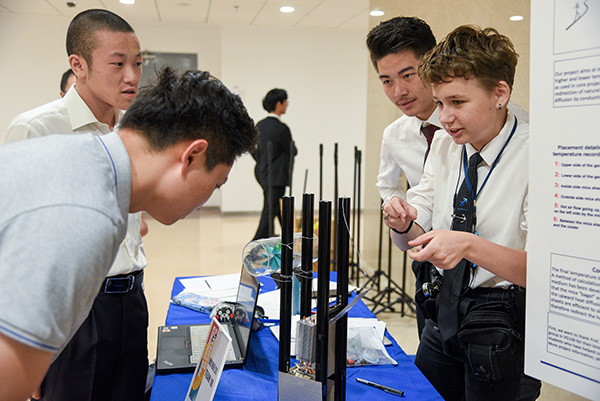
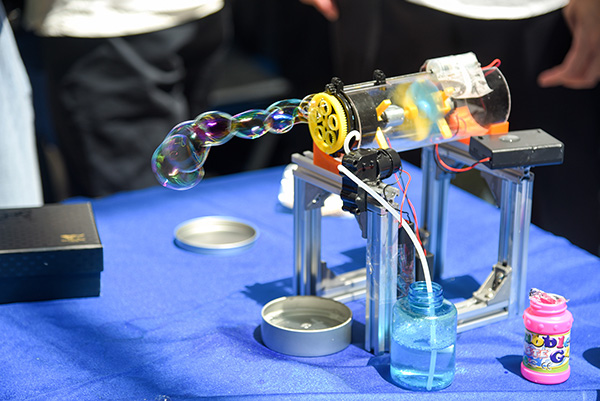
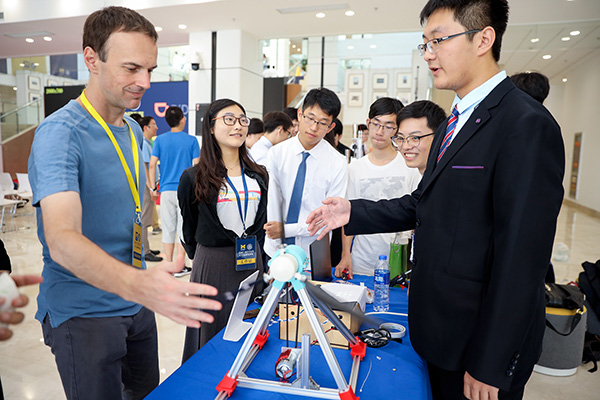
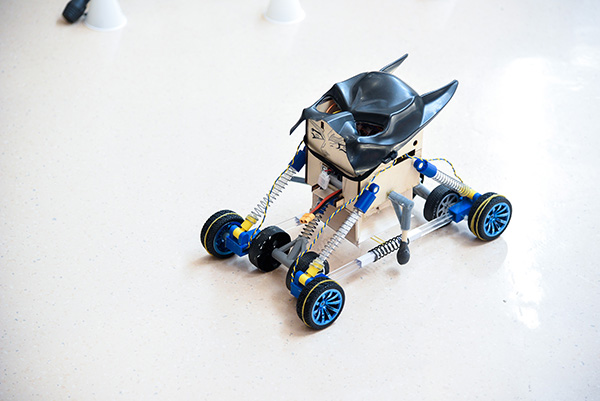
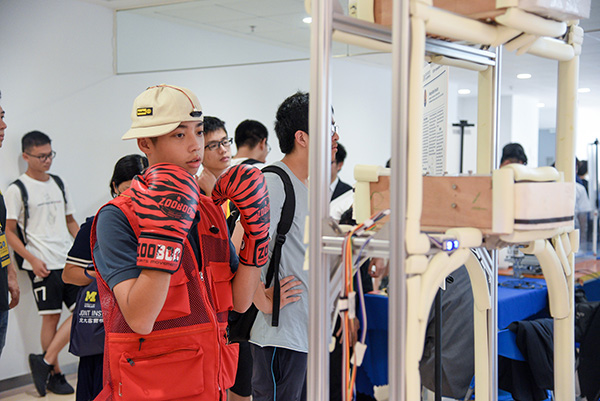 On-site display of freshmen projects
On-site display of freshmen projects
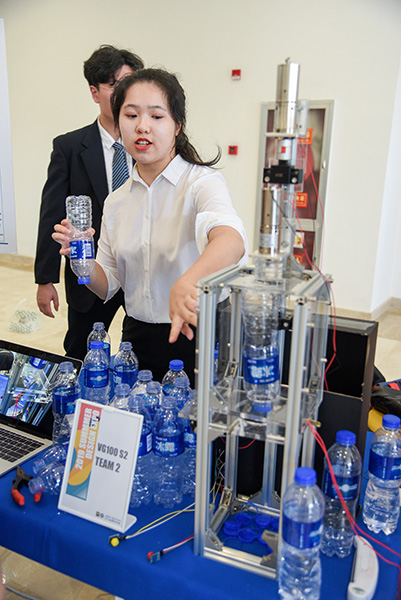
Plastic Bottle Buster: preprocessing machine for the recycle of plastic bottles
As garbage sorting becomes a trend in Shanghai, every Shanghai dwelling must be aware that plastic bottles are recyclable. However, the recycling of plastic bottles is a complicated process as different kinds of plastic must be recycled in different ways. The cap and the sealing ring must be separated from the main part before recycling. To improve the efficiency and reduce labor cost, an aluminum-based plastic bottle buster was designed. The machine can fix the bottle with a needle board on the top and a clamp in the bottom. And by rotating the needle board, the cap and the sealing ring can be separated from the bottle. Leveraging the difference in the melting points of different plastic, an electrical heating bar is applied to burn out the sealing ring so as to separate it from bottle easily.
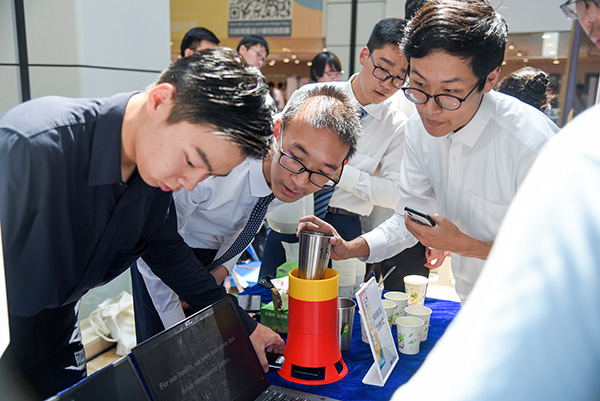
Self-cooling cup
In the face of continuous heatwave, having a cup of cool water as you need seems luxurious. Existing products on the market with satisfying cooling performance rely heavily on electricity, which is not energy-saving and environmental friendly. Yet waiting boiled water to cool down naturally can cause anxiety. A smart self-cooling cup is designed to cool down hot water using its thermal energy. Leveraging the electrothermal energy conversion, heat conduction, forced convective heat transfer and the design of a high-efficiency fan, the cup can accelerate the cooling progress by 30% without consuming external energy. The JI project team is currently working on the second version of the cup. This patented product from JI is very much likely to be on the market in the near future.
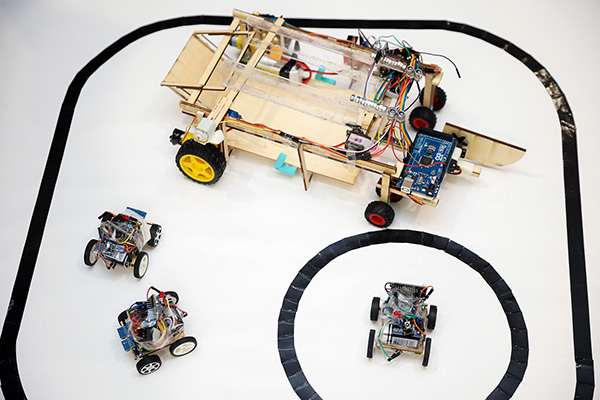
Tank carrier for the Mars
Ever since the discovery of water on the Mars, the exploitation of Mars has become a trendy topic. Since the early stage of exploitation relies on robots, the JI project team is keen to design a tank carrier with the ability to carry multiple auxiliary vehicles. The main body structure of the explorer is mostly horizontal and vertical with two “floors”, the space of which can be loaded with four auxiliary vehicles. All vehicles can be controlled automatically or manually. In addition, the main explorer is equipped with a jogging function to overcome the bumpy surface on the Mars. The whole design is mainly controlled by Arduino boards. Multiple servos and motors are used to open and close the hatches and control the movement, and infrared sensors are used to follow the tracks.
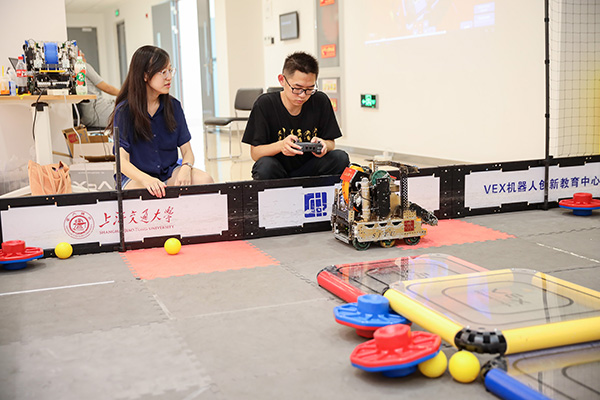
As a JI’s brand course, “Introduction to Engineering” allows students to participate in interesting projects. Students are encouraged to find problems in daily life and use the basic engineering knowledge to solve the problems with innovative thinking. According to Professor Yanfeng Shen, “Introduction to Engineering” is more like a discovering course, where the course focuses more on the students’ “engineering instinct” and lead them to find, ask and solve problems from a scientific and professional perspective. In addition, the course teaches technical writing in English, an essential skill for engineers.
In light of the growing needs of large data and artificial intelligence around the world, more science and technology courses will be added under minor degrees of data science and computer science, on top of the existing computer and engineering courses at JI, in order to train talents in “New Engineering”.
Corporate-sponsored Capstone design projects deepen the Institute-enterprise partnership
Corporate-sponsored graduation Capstone design projects have played a huge role to the success of the JI design expos. This year, all the 26 design projects were sponsored by leading companies including Midea, Didi, Intel, Panasonic, General Motors, VMware, Giti Tire, Hongjing Drive, Huayu Vision, Foxconn Industrial Internet, DeepMag, DataPipeline, WECAN Startup Accelerator and Shanghai Telemedicine Technology. These daily-life related subjects are all from the first-tier technical projects of enterprises.
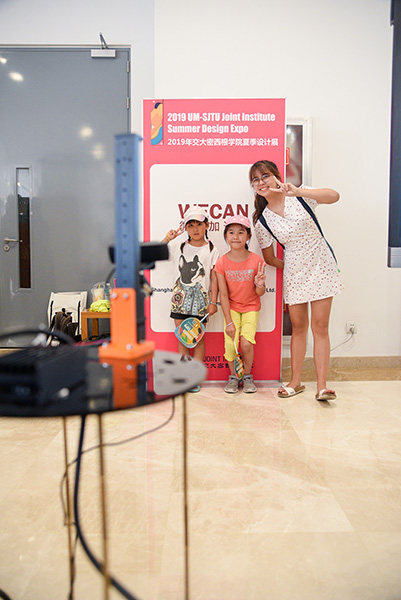
Advanced development onstate-of-art robots
Have you dreamed of having a photographer taking pictures of you and your family whenever you need? The advanced development on state-of-art robots sponsored by WECAN Startup Accelerator will make your dreams come true. The project aims at developing a robot application targeted at taking professional group photos. The base control of the robot is operated using ROS (robot operating system). The camera and microphone is also integrated under ROS platform. The robot will have a user interface to show the current figure taken by the camera. The robot will auto-adjust its position according to the figure to ensure all people are in center of the figure. Users will be able to directly adjust the position using voice control. While moving, the robot will ensure that it will not collide with person or any object using a LiDAR. After the position is settled, the robot can take the picture under the comment from the user. Then, the user has the option to send the picture to his phone.
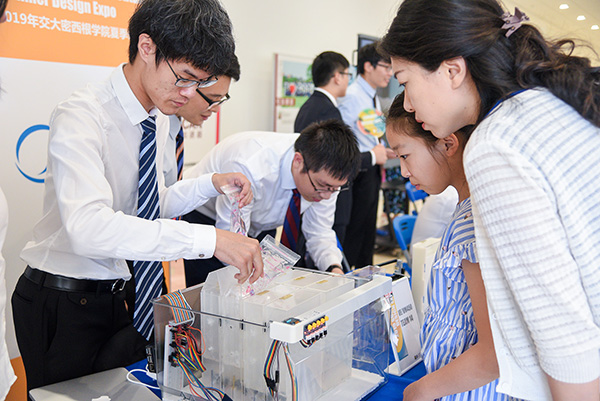
Breast milk storage structure
With the development of refrigerator industry, the market has grown increasingly specialized and segmented, among which the market for maternal care is gaining more and more attention from the stakeholders. Working mothers with infants at home want the breast milk to be well stored in the refrigerator. If the milk bag falls down before it is frozen, the sealing part of the milk bag may be infected with bacteria, thus contaminating the whole bag of breast milk and causing hazards. If the milk bags are not handled properly based on timestamps, those put in later may be consumed first, causing some bags of milk to be forgotten and wasted. To fill the gap in the current refrigerator market pertinent to maternal care, a Bee Hive storage structure is proposed by the team sponsored by Midea. The design divides a common refrigerator drawer into small blocks, each holding one bag of breast milk and preventing the sealing from contacting possible hazards. Meanwhile, the system of blocks has a computer-controlled FIFO (First-In-First-Out) mechanism to help users always get the oldest milk bags out. A user interface with LCD screen and buttons is designed for receiving user’s command and display the system status. After users specify the need (load/dispense) and quantity, the system decides which blocks will rise.
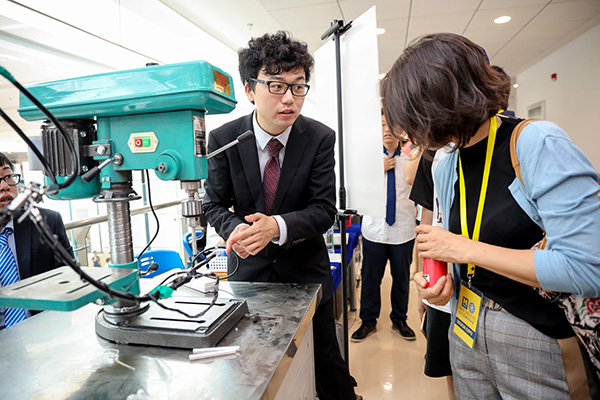
Non-intrusive condition monitoring system for rotating devices
Equipment condition monitoring plays an important role in improving the production efficiency in managing the production of a plant. Traditional monitoring methods, such as acceleration sensor applications, cannot be applied to rotating devices since they fail to fit on the surface of the targeted device. As such, the team sponsored by Foxconn Industrial Internet designed an air sensor-based monitoring system to assess health performance of equipment by comparing the current acoustic signal with that under a healthy status.
The monitoring system uses two types of monitoring methods, passive and active. Passive monitoring uses the acoustic signal of device when it rotates. The assessment of the health performance is based on the comparison between the distribution, number and height of wave crest of the acoustic signal detected through Fourier transform and that under a healthy status. Active monitoring uses two ultrasonic horns to emit ultrasonic waves of different frequencies, f1 and f2 for example, to the stationary device from one side. The ultrasonic microphone then collects acoustic signals from the other side and converts them into frequency domain signals. If the collected signals contain waves of the frequency of f1-f2 or f1-f2, the structure is probably damaged. The assessment is deduced by calculating the amplitude at such frequencies. On top of that, they also designed a set of user interface for real-time display of information of health performance, sensor signals, etc. The user interface can also send alert when the health quotient is lower than the threshold value and advice users to repair or replace the equipment in a timely manner. In collaboration with the research team led by JI Professor Yanfeng Shen, the team also worked to expand the scope of the system, such as monitoring composite materials used in wind turbine blades. In the future, with the improvement of the intelligence of manufacturing industry, the non-invasive monitoring system based on air sensor has a promising future in the production in factories and structural monitoring.
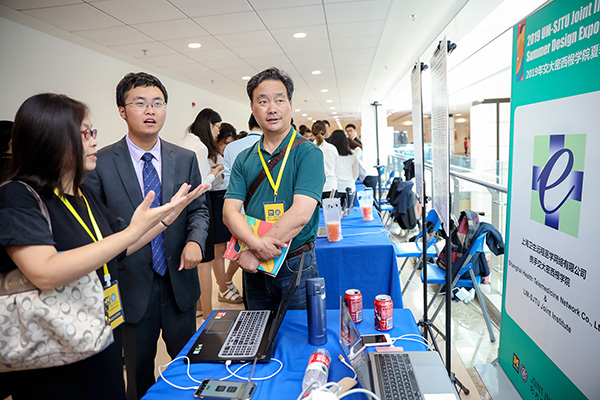
Mobile medical service for Belt and Road region
Have you heard of telemedicine? With the development of healthcare industry and its combination with telecommunication, telemedicine emerges as a new internet-based industry. The lack of access to medical services is still plaguing the people in remote and less-developed areas. The Mobile Health for Belt and Road region (mHBR) project led by JI professor Pradeep Ray aims at bringing mHealth to the developing countries along the belt and road. The team cooperates with Shanghai Telemedicine Technology by leveraging the services on its Wechat platform. Their partnership enhances the management efficiency of the proportion of telemedicine and reduces the workload of doctors and admin staffs in hospitals. To protect the sensitive medical data, the team modified the traditional Wechat platform so as not to store the data outside the hospital, thus ensuring the security of data and the compliance with relevant regulations. The product allows doctors and hospital admin staffs to diagnose and control the quality of medical cases through Wechat.
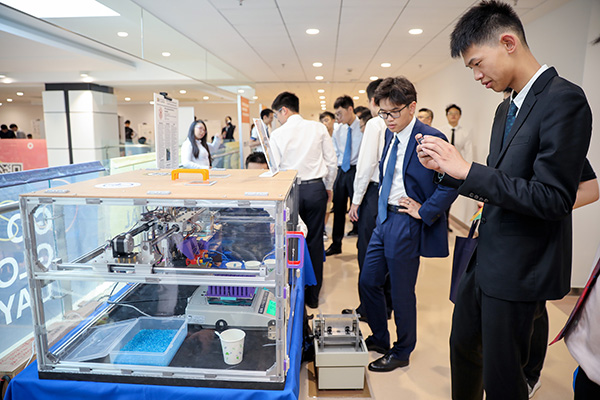
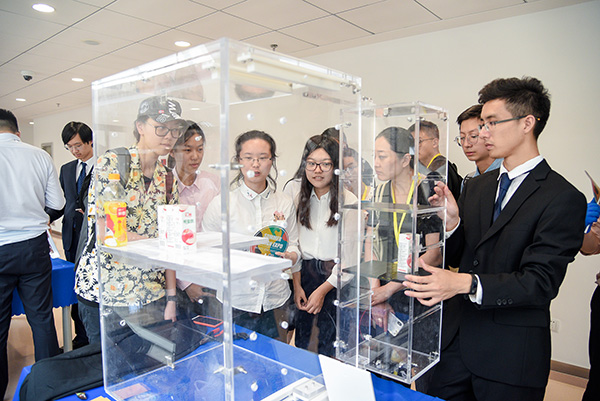
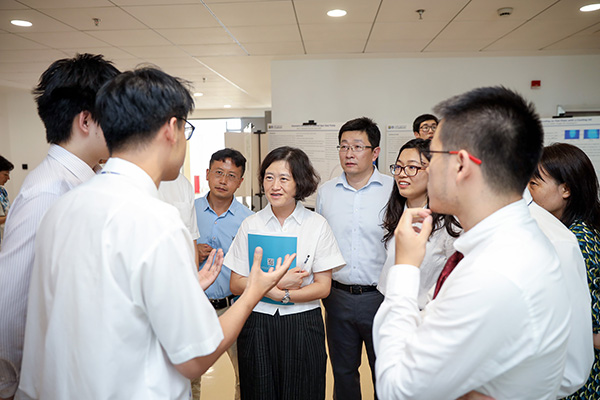
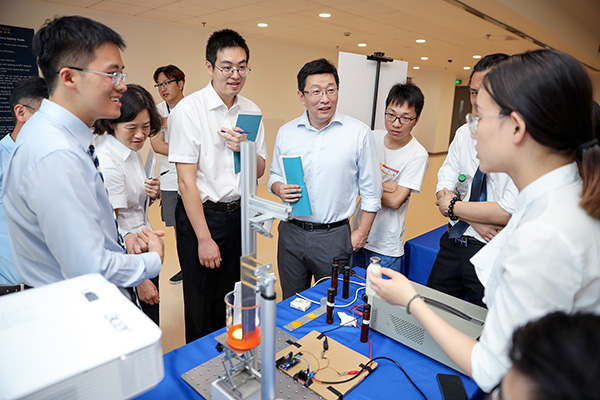
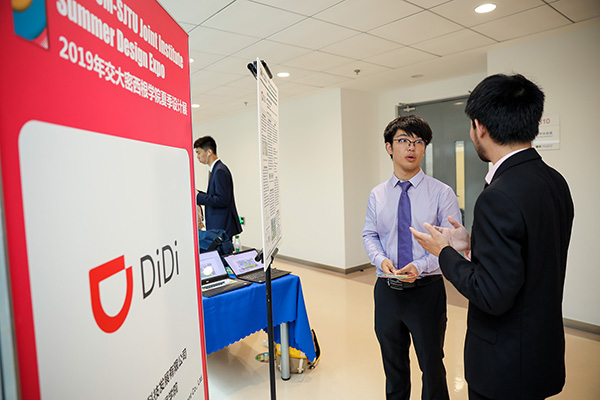
Display of Capstone projects
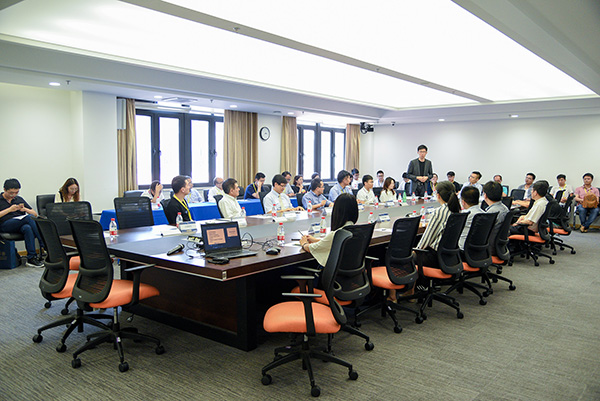
JI is the leading institute at SJTU to carry out pilot reform of undergraduate graduation designs, abiding by a totally different model from other engineering schools in the country. JI combined the mechanical engineering and electrical and computer engineering courses as required courses. The graduation design subjects are set by enterprises based on real life engineering problems. Under the guidance of professors and company engineers, JI students need to submit a team essay and an individual essay in English, and participate in an English oral debate as a team at the end of their graduation projects.
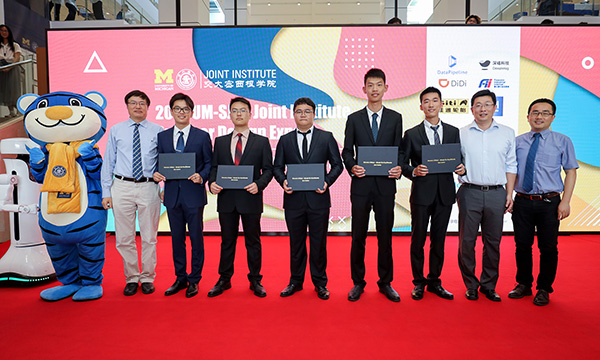
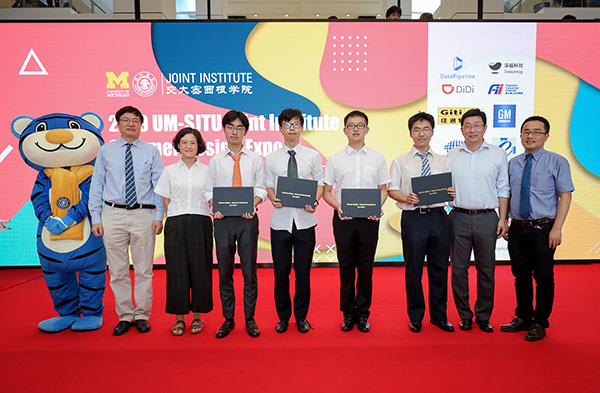 Project teams receive Gold Awards on stage
Project teams receive Gold Awards on stage
Since the first corporate-sponsorship was launched at JI in 2010, more and more multinational companies have sponsored “custom” projects that follow their market trends. In recent years, the proportion of JI’s corporate-sponsored projects has increased every year and JI students have earned accolades from the sponsors. The corporate-institute partnership creates a win-win outcome. Through the courses, exchanges and other effective means, JI stimulates students’ creative thinking and provides a multichannel and comprehensive platform for talent training and business cooperation. According to the design expo supervisor Professor Chengbin Ma, sources of sponsors and their businesses have become more and more diversified and internationally extensive. An increasing number of multinational corporations, large state-owned enterprises and leading startups from Beijing, Shanghai and Shenzhen join the sponsorship list. The cooperation projects tend to penetrate into the fields of information technology. Artificial intelligence and emerging Internet technologies have become new leading directions.





